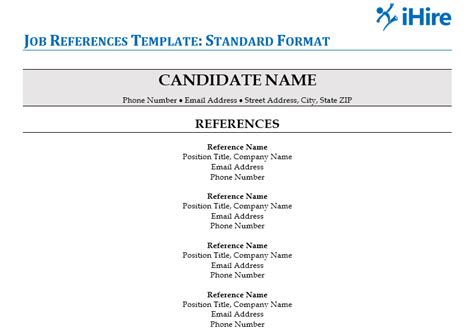Providing References For Job Applications: Dos And Don'ts

Providing references is an essential part of any job application process. It is a way for employers to verify the information you provided and get an insight into your work ethic and character. However, there are some dos and don’ts that you should keep in mind when providing references. In this article, we will cover everything you need to know in order to provide references that will help you land your dream job.
Do: Choose the Right References
Choosing the right references is crucial. You want to choose people who can speak to your skills and work ethic. Here are some tips:
- Choose people who know you well and can speak to your work
- Choose people who have a good reputation in your industry
- Choose people who have supervised you or worked with you directly
- Choose people who can speak to your character and reliability
Don’t: Choose Family or Friends as References
While family and friends may know you well, they are not the best references for job applications. This is because they may be biased and cannot speak to your work experience. It is better to choose professional references who can provide insight into your work ethic.
Do: Ask for Permission
Before providing someone’s contact information as a reference, it is important to ask for their permission. This shows respect for their time and allows them to prepare for any potential calls or emails from your potential employer.
Don’t: Assume Someone Will Be a Reference
Just because someone knows you well does not mean they are willing or able to be a reference. It is always important to ask for permission and make sure they are comfortable providing a reference for you.
Do: Provide Relevant Information
When providing someone’s contact information as a reference, it is important to provide them with relevant information about the position you are applying for. This allows them to speak to your skills and experience as they relate to the job.
Don’t: Provide Outdated Information
If you have not spoken to a reference in a while, it is important to reach out and update them on your career and the job you are applying for. Providing outdated information can make you look unprepared and unprofessional.
Do: Follow Up and Say Thank You
After your potential employer has contacted your references, it is important to follow up with them and thank them for their time. This shows respect and gratitude for their support.
Don’t: Forget to Keep Your References Informed
If you are offered a job, it is important to keep your references informed. Let them know that you have been offered the position and thank them again for their support. This helps maintain positive relationships and ensures that they are aware of your career progress.
Conclusion
Providing references is an important part of any job application process. By following these dos and don’ts, you can ensure that you provide references that will help you land your dream job. Remember to choose the right references, ask for permission, provide relevant information, and follow up with your references. By doing so, you can demonstrate your professionalism and work ethic.
FAQs
What should I do if I don’t have any professional references?
If you do not have any professional references, you can choose people who know you well and can speak to your character and work ethic, such as a teacher or coach.
How many references should I provide?
Most job applications require three references. However, it is always best to check the job posting or ask the employer directly for their requirements.
Should I provide references on my resume?
No, it is not necessary to provide references on your resume. Instead, you can provide them upon request from the potential employer.
What should I do if one of my references declines?
If one of your references declines, it is best to find another reference who can speak to your skills and work ethic.
Can I provide a reference from a previous job even if I was terminated?
Yes, you can provide a reference from a previous job even if you were terminated. However, it is important to choose someone who can speak to your skills and work ethic, regardless of the circumstances surrounding your termination.
